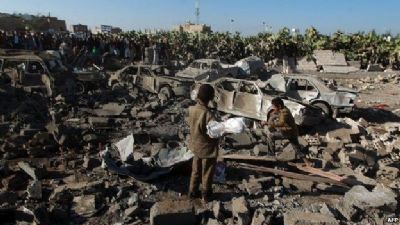The death toll of a suspected Saudi-led coalition airstrike that hit a family's house in southern Yemen has been raised to 11, including four children from one family, security officials and witnesses said Wednesday.
The officials said that warplanes, thought to be Emirati, fired two missiles at the family's house in the town of el-Mahala, in the southern province of Lahj. The house was flattened and only one child from the family survived the strike, they said.
The officials said the home is adjacent to a building that is suspected of housing Islamic militants.
A witness, Ahmed Hadash, said he heard explosions for 40 minutes while the warplanes were flying.
"The bodies were distorted and the human remains were everywhere," he said.
The governor of Lahij, Naser al-Khoubeigi, has called on the Yemeni government and the coalition to conduct an investigation. He denied any communications between the authorities in Lahij and the coalition.
"We know nothing about the attack. The coalition conducts attacks without informing us. The responsibility of this operation is on those who provide the coalition with the wrong coordinates," he said.
Security officials claim that the Saudi-led coalition regularly conducts unreported strikes and has detained many people, claiming that they are members of al-Qaida or the local Islamic State group affiliate.
"They have their own prisons," one official said.
Also on Wednesday, a suspected Saudi-led coalition airstrike hit a mineral water factory in Lahij, security officials said. No causalities were reported.
All officials spoke on condition of anonymity because they were not authorized to brief the media.
Yemen has been mired in a conflict pitting Shiite rebels against the internationally-recognized government, which is backed by a Saudi-led coalition. Extremist factions like al-Qaida and the Islamic State group have gained ground amid the chaos.
Since the war against Shiite rebels, known as Houthis, began, more than 8100 people in Yemen have been killed. The United Nations says more than 80 percent of Yemenis are in dire need of food, water and other aid as a result of the conflict in the Arab world's poorest country.
May 25, 2016
Saudi Coalition Airstrike in Yemen Kills 11 From Same Family
Date
May 25, 2016
Title
Yemeni Officials: Airstrike Kills 11 From Same Family,
ABC News
Author(s)
Ahmed Al-Haj, Associated Press

